DIFFERENCES BETWEEN BRITISH AND AMERICAN ENGLISH
5000 so'm
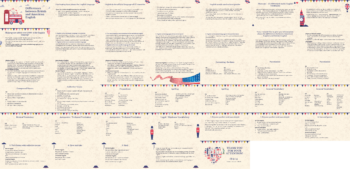
DIFFERENCES BETWEEN BRITISH AND AMERICAN ENGLISH
Differences between British and American English
Fascinating facts about the English language
Today, there are over 2 billion English speakers in the world, making English the most widely spoken language globally. It is also the third largest by number of native speakers. English holds official status in 67 countries, even in some where it is not the most spoken language. Among these are the USA, the UK, Canada, Australia, and New Zealand.
The history of the English language
English evolved over centuries through several major stages:
- Old English – brought to the British Isles by “Angles” settlers in the 5th century.
- Middle English – influenced by Norman French after the 1066 conquest.
- Early Modern English – the period of Shakespeare, printing press, and exploration.
- Modern English – from the 1800s to today, marked by global spread through the British Empire and American influence.
History of American English
English arrived in America with British settlers in the 1600s, starting from Jamestown, Virginia. Over time, American English developed unique vocabulary, pronunciation, and spelling due to contact with other cultures and independence from Britain.
Main differences between British and American English
1. Dates and Time
| UK | US |
|---|---|
| DD/MM/YY → 17 February 2017 | MM/DD/YY → February 17, 2017 |
| 9.30 am | 9:30 am |
2. Punctuation
- British English: No full stops after titles (Mr, Dr, Mrs). Punctuation outside quotation marks: “Hello”, she said.
- American English: Uses full stops (Mr., Dr.), punctuation inside quotation marks: “Hello,” she said.
3. Spelling
| British English | American English |
|---|---|
| colour, favour, theatre, organise, analyse | color, favor, theater, organize, analyze |
| travelling, centre, programme, grey | traveling, center, program, gray |
4. Vocabulary
| British English | American English |
|---|---|
| car park | parking lot |
| lift | elevator |
| flat | apartment |
| holiday | vacation |
| post |
5. Grammar and Usage
- Present Perfect vs. Past Simple:
UK: “He has already had lunch.”
US: “He already had lunch.” - Got vs. Gotten:
UK: “You could have got hurt!”
US: “You could have gotten hurt!” - Collective Nouns:
UK: “The team are winning.”
US: “The team is winning.” - Have vs. Take:
UK: “Have a shower.”
US: “Take a shower.” - Shall:
UK: “Shall we meet at 5?”
US: “Do you want to meet at 5?”
6. Prepositions
| British English | American English |
|---|---|
| at the weekend | on the weekend |
| in hospital | in the hospital |
| Monday to Friday | Monday through Friday |
| fill in a form | fill out a form |
7. Pronunciation and Intonation
Pronunciation also differs between the two dialects. British English tends to be non-rhotic (the “r” at the end of words like “car” is not pronounced), whereas American English is rhotic, pronouncing the “r” clearly. Intonation in British English is often flatter, while American English has more pitch variation.
Fun facts about the English language
- The Oxford English Dictionary lists around 171,476 words.
- Roughly three new words are added every two hours!
- Shakespeare alone introduced over 1,000 new words to English.
- 65% of all written English can be understood with the 300 most common words.
Conclusion
Both British and American English are prestigious and widely used across the world. Despite their differences in spelling, grammar, and vocabulary, they share a common origin and continue to influence each other through media, education, and global communication. In the 21st century, English has become the international language of both conventional and digital communication.
THANK YOU FOR YOUR ATTENTION!
Follow us on social networks!
=== Taqdimot 1 ===
Differences between British and American English
=== Taqdimot 2 ===
Fascinating Facts about the English language
There are 2 billion English speakers in the world
With 2 billion speakers worldwide, English is the largest language by the number of speakers.
It is also the third largest language by the number of native speakers.
=== Taqdimot 3 ===
English is the official language of 67 countries
That’s right, 67 countries! In some countries where English is not the most spoken language, it is still an official language.
That means, it’s accepted by a country’s government, and often taught in schools.
That’s a lot of the world covered with just one language!
Amongst these countries are the “core Anglosphere“. These include:
=== Taqdimot 4 ===
The USA (with at least 230 million native english speakers),
The UK (with 60 million speakers),
Canada (at least 20 million),
Australia (at least 17 million),
New zealand (4.8 million).
Due to the colonial history of the british empire, some countries also have english as an official language.
These include barbados, india, nigeria and cyprus.
=== Taqdimot 5 ===
English words used to have gender
If you speak Spanish, German or French, you’ll be familiar with languages where nouns come in three varieties: masculine, feminine or neutral.
These days, English nouns don’t have a gender. But once upon a time, they did.
Up until the 1200s, instead of using the articles “the” or “a”, Old English had the masculine article “se” and the feminine article “seo”.
=== Taqdimot 6 ===
There are ~ 171,000 words in the English vocabulary
Before we explain just how deep the English language is, we need to mention — there is absolutely no need for English learners to be scared by the number of words there are. In fact, research shows that you will be able to understand about 65% of all writing in English with only the 300 most common words.
At the time of writing, the Oxford English Dictionary contains 171,476 words.
=== Taqdimot 7 ===
It’s estimated that three words are added to the dictionary every two hours, and roughly 1,000 words are added to the Oxford English Dictionary every year.
In 2020 alone, “LOL”, “awesomesauce – aw·suhm·saws”, and “shticky – sti·kee” were all added to the dictionary, which shows how flexible and fun the language has become.
=== Taqdimot 8 ===
Shakespeare added over 1,000 to the English language
The English language wouldn’t be the same without the writer of famous plays like Romeo and Juliet and Hamlet.
Through him, we were introduced to words like “lonely”, “critic”, and “addiction”.
6 reasons why English is the most valuable language you can learn in 2020 (and beyond)
=== Taqdimot 9 ===
1. English is the dominant language in academia
Learning English opens the door to some of the world’s top colleges and universities, particularly in the United States and United Kingdom.
Many of these institutions ask for a B2,C1 level of English.
2. English is the most common business language
Learning English will make you more employable to not just businesses in the UK and US, but also businesses across the world.
Research by Cambridge English found that English is important for over 95% of employers, even in many countries where English is not an official language.
=== Taqdimot 10 ===
3. The most popular entertainment in the world is in English
Hollywood and Netflix have opened up our minds to brilliantly-told stories and incredible must-see TV. When you learn English, you won’t need to read pesky subtitles with weird translations any longer! YouTube is also a great resource to learn a language, since 66% of YouTube’s content is in English. There are also lots of vloggers and channels dedicated to online language learning,
4. English is the most useful language for travel
In many popular tourist destinations, hospitality workers use English as it helps their businesses. They are able to better communicate with potential customers. It also helps customers find what they need and get their money’s worth.
=== Taqdimot 11 ===
5. English is the language of the online world
Over half of the most visited web pages in the world are in English, making it the dominant language online. With over 1 billion internet users typing in English, you’ll be able to access many types of resources and learning platforms to strengthen your skills. English is not just an advantage for online entertainment. Individuals can develop and advertise their skills using English on the internet, such as building their own website or taking an online course. International companies are also using online tools such as email and Linkedin to source new English-speaking employees, and Zoom to conduct online interviews.
=== Taqdimot 12 ===
6. English is the easiest language in the world to learn
To start, English nouns have no genders and a (relatively!) simple grammar system.
Sentence structures are fairly straightforward without a tricky morphology. Morphology is when words change depending on their function in a sentence. For example, in English you won’t change the ending of an adjective depending on the gender of the noun in a sentence, like you would in languages like Spanish. This makes learning nouns and adjectives a breeze.
=== Taqdimot 13 ===
Now, I would like to give you information about the differences between American English and British English
The English language was introduced to the Americas by the arrival of the British, beginning in the late 16th and early 17th centuries. The language also spread to numerous other parts of the world as a result of British trade and settlement and the spread of the former British Empire, which, by 1921, included 470–570 million people, about a quarter of the world’s population.
=== Taqdimot 14 ===
History of British English
To truly understand the differences between these two main dialects, we need to understand the history of the English language.
The history of British English can be broken down into four parts.
Old English
The first part, according to Dennis Freeborn, the former Head of Language Studies at the College of Ripon and York St. John in the UK and former Chief Examiner in the English Language studies for the London University Schools Examinations Board. It is when English was first brought to the British Isles in the first half of the fifth century AD by “Angles” settlers from across the North Sea.
=== Taqdimot 15 ===
Middle English
The second part, known as the “Middle English” period, was from about 1100 to 1500. The language was greatly affected by the Norman-French Conquest period between 1066 to 1075, when William I, Duke of Normandy, also known as William the Conqueror, fought for and laid claim to the English crown.
End of Middle English
The end of the Middle English period and the outsized influence of French on the English language came about due to two factors.
One of the major factors was the Black Death which negatively affected the French influence on the English language in three ways. First, due to the death of a large number of French nobility, there wasn’t a large population of native French speakers living in England to keep the language alive.
=== Taqdimot 16 ===
Early Modern English
The third part of the history of the English language is known as “Early Modern English”. This period lasted from 1500-1800. During this period, England experienced a great time of technological, political, and cultural advancements, such as the introduction of the printing press in 1476 by William Kakston and the exploration and colonization of the Americas.
Modern English
The final part of the history of the English language in Britain often called “Modern English”, started from the 1800s until the present day. As the British Empire rose to global dominance, they also spread the English language, making it the first truly global language. It was also during this time that American English started to develop and branch off into its own distinct dialect.
=== Taqdimot 17 ===
History of American English
As such, it is important to look at this starting off point to best understand the history of American English.
Early Modern English or Elizabethan English had a big impact on the early development of the American dialect. The first permanent English colony, Jamestown, Virginia, was found in 1607
Continuous Evolution
American English further developed after the initial Early Modern English period.
Through contact with many different cultures in the Americas, the language slowly evolved. However, it is interesting to note that the basic grammar and structure of the language kept its British roots. The main influence of these other languages was vocabulary.
=== Taqdimot 18 ===
American English is the variety of the English language spoken in the USA. The vocabulary used by American speakers has distinctive features, they are called Americanisms.
All into-English translators need to be aware of these key differences. Adapting your translation to the specific demands of British or American English is a simple yet essential method to ensure that your English translation is both accurate and effective.
=== Taqdimot 19 ===
Formatting the dates
UK US
DD/MM/YY MM/DD/YY
17 February 2017 February 17, 2017
Full stop + am/pm Colon + am/pm
9.30 am (AM, PM/a.m., p.m.) 9:30 am (AM, PM/a.m., p.m.)
=== Taqdimot 20 ===
Punctuation
UK
No full stop after titles
Dr Mr Mrs Ms
Lowercase number abbreviation no. 5790
Only uses Oxford comma at the end of a list for clarification
I had eggs, toast and orange juice.
Punctuation outside quotation marks (unless it is part of the spoken sentence).
“Hello”, she said, “How are you today?”
=== Taqdimot 21 ===
Punctuation
US
Full stop after titles
Dr. Mr. Mrs. Ms.
Capitalised number abbreviation
No. 5790
Almost always uses Oxford comma
I had eggs, toast, and orange juice.
Punctuation inside quotation marks
“Hello,” she said, “How are you today?”
=== Taqdimot 22 ===
Compound Nouns
UK
Always uses hyphens for compound adjectives before a noun
a print-out presentation
Gerund + Noun Skipping Rope
US
Tends to make compound words
a printout presentation
Infinitive + Noun Jump rope
=== Taqdimot 23 ===
Collective Nouns
UK
Usually plural – A group is typically thought of as a group of individuals
The committee were unable to agree.
Liverpool are winning!
Muse are a great band.
The Beatles are playing at Wembley.
US
Almost always singular, excluding plural sports teams and band names
The committee was unable to agree.
Liverpool is winning!
The Patriots are winning!
Muse is a great band.
The Beatles are playing at Wembley.
=== Taqdimot 24 ===
Prepositions
UK US
At the weekend On the weekend
Play in a team Play on a team
In hospital In the hospital
Monday to Friday Monday through Friday
Fill in a form Fill out a form
Write to someone Write someone
At the back In the back
=== Taqdimot 25 ===
Spelling
UK
-ll travelled, levelled
-re centre, litre, theatre
-our colour, favour
-ce licence, defence,
-ise summarise, organise
-lyse analyse
-ae aetiology, anaemia, haemoglobin
-oe foetus, oedema, oesophagus
-ogue dialogue, analogue
-ph Sulphate, Sulphur
Programme
Kerb
Grey
=== Taqdimot 26 ===
Spelling
US
-l traveled, leveled
-er center, liter, theater
-or color, favor
-se license, defense
-ize summarize, organize
-lyze analyze
-e etiology, anemia, hemoglobin
-e fetus, edema, esophagus
-og dialog, analog
-f Sulfate, Sulfur
Program
Curb
Gray
=== Taqdimot 27 ===
General Vocabulary
UK
Quarter past (six)
Half past six
Ten to six
Anticlockwise
Fortnight
Postcode
Telephone/Tel.
Post
US
Quarter after (six)
Six thirty
Ten to, till, or before six
Counter-clockwise
Two weeks
Zip code
Phone
Mail
=== Taqdimot 28 ===
General Vocabulary
UK Timetable
Car park
Queue
Full stop
Nought/zero
CV
Holiday
Боокинг
City Centre
Flat
Lift
Ground floor
Expiry Date
Engaged
Yours Sincerely,
US
Schedule
Parking lot
Line
Period
Zero
Resume
Vacation
Reservation
Downtown
Apartment
Elevator
First Floor
Expiration Date
Busy
Sincerely Yours,
=== Taqdimot 29 ===
Medical Vocabulary
UK General Practitioner
Chemist / Chemist’s
Clinical Trial
US
Family Practitioner / Physician
Pharmacist, Drugstore / Pharmacy
Clinical Study
=== Taqdimot 30 ===
Automotive / Technical Vocabulary
UK
Lorry/ articulated lorry
Caravan
Boot
Bonnet
Tyre
Petrol
Gear lever
Silencer
Windscreen
Wing mirror
Indicators
Motorway
Zebra crossing
Pavement
Mobile
=== Taqdimot 31 ===
Automotive / Technical Vocabulary
US
Truck/tractor-trailer
Trailer
Trunk
Hood
Tire
Gas
Gearshift
Muffler
Windshield
Rearview mirror
Blinkers
Highway/ freeway/expressway
Crosswalk
Sidewalk
Cellphon
=== Taqdimot 32 ===
Legal / Business Vocabulary
UK US
Solicitor / Barrister Lawyer, Attorney
Managing Director CEO (Chief Executive Officer)
Estate Agent Realtor
Cheque Check
=== Taqdimot 33 ===
1. Present perfect and past simple
In British English, people use the present perfect to speak about a past action that they consider relevant to the present.
The present perfect can be used in the same way in American English, but people often use the past simple when they consider the action finished. This is especially common with the adverbs already, just and yet.
=== Taqdimot 34 ===
1. Present perfect and past simple
British English
He isn’t hungry. He has already had lunch.
– Have you done your homework yet?
– Yes, I’ve just finished it.
American English
He isn’t hungry. He already had lunch.
– Did you do your homework yet?
– Yes, I just finished it.
=== Taqdimot 35 ===
2. Got and gotten
British English
You could have got hurt!
He’s got very thin.
She has got serious about her career.
BUT:
Have you got any money?
We’ve got to go now.
American English
You could have gotten hurt!
He’s gotten very thin.
She has gotten serious about her career.
=== Taqdimot 36 ===
British English
My family is/are visiting from Pakistan.
My team is/are winning the match.
The crew is/are on the way to the airport.
BUT:
The police are investigating the crime.
American English
My family is visiting from Pakistan. My team is winning the match. The crew is on the way to the airport.
BUT: The police are investigating the crime.
3. Verb forms with collective nouns
=== Taqdimot 37 ===
British English
I’m going to have/take a shower.
Let’s have/take a break.
American English
I’m going to take a shower.
Let’s take a break.
4. Have and take
=== Taqdimot 38 ===
British English
It’s hot in here. Shall I open the window?
Shall we meet in the café at 5?
Shall we try that again?
American English
It’s hot in here. Can I open the window?
Do you want to meet in the café at 5?
How about we try that again?
5. Shall
=== Taqdimot 39 ===
Today we looked through all the differences between American English and British English.
As a conclusion, we can say that the two leading normative models in fostering standard of educated usage are British and American English.
Currently, English is the de facto international language of the Third World.
In 21st century English has become the international language of communication, both conventional and digital.
=== Taqdimot 40 ===
THANK YOU FOR YOUR ATTENTION!
Follow us on social networks!
🇬🇧🇺🇸 Read the full presentation: “Differences between British and American English” on Slaydchi.uz
Slaydchi.uz – English learning, linguistics, and education resources in Uzbekistan.
Related topics: English Grammar, Language Skills
| 5 |
|
0 |
| 4 |
|
0 |
| 3 |
|
0 |
| 2 |
|
0 |
| 1 |
|
0 |



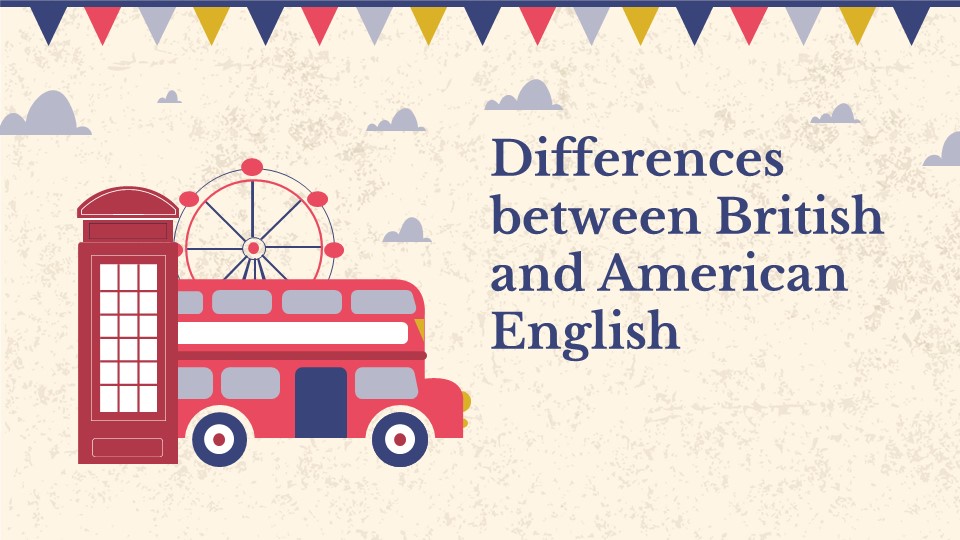
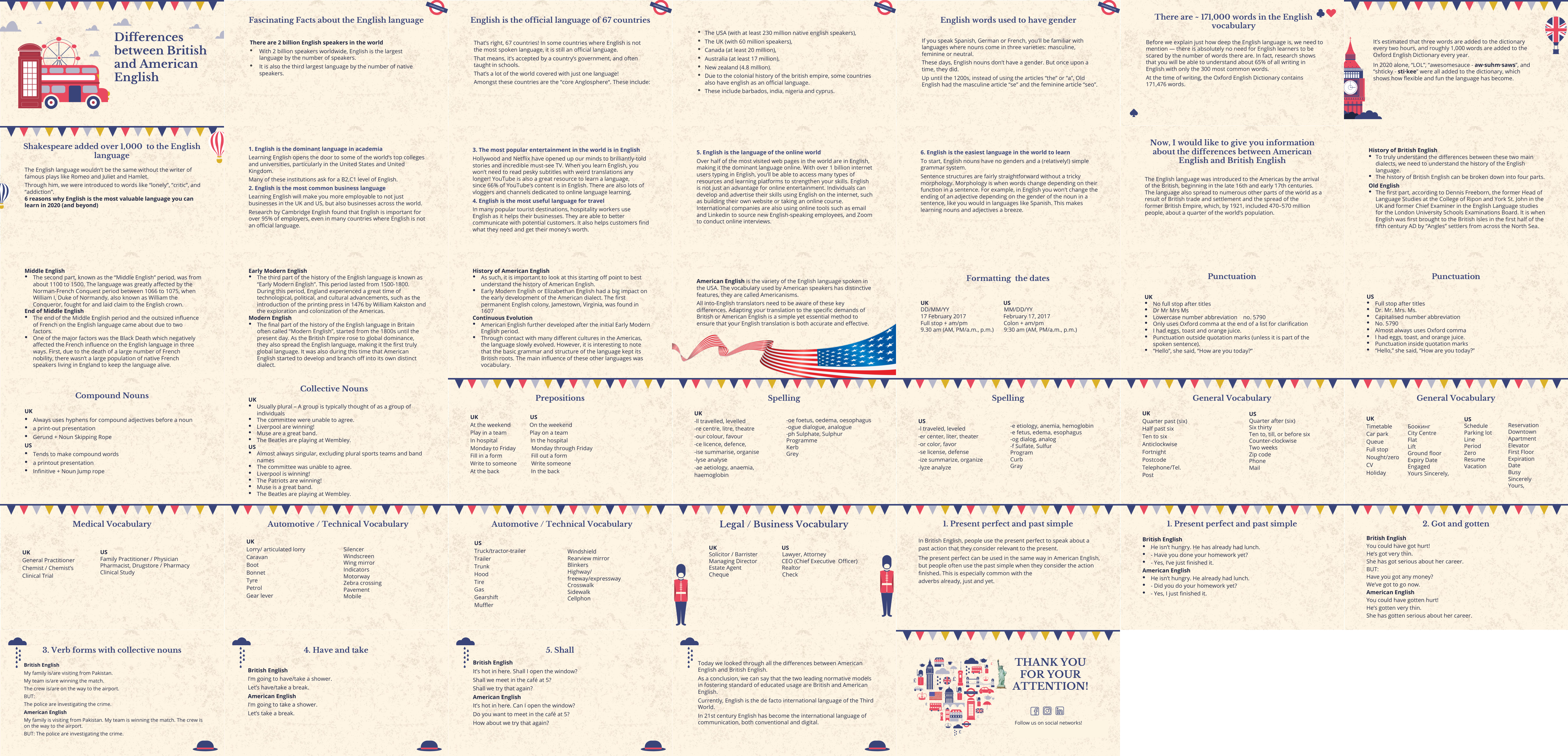


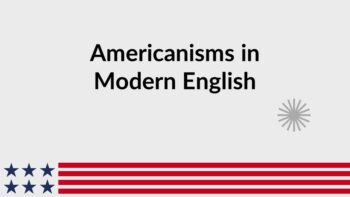
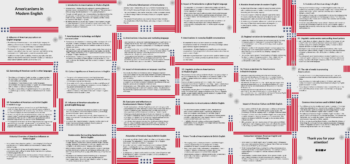
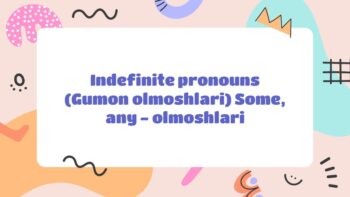
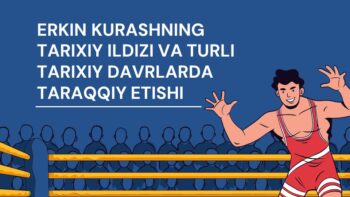
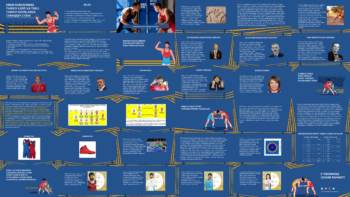
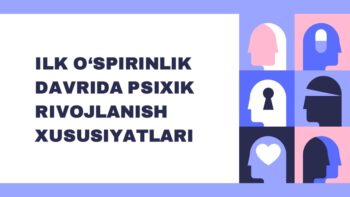
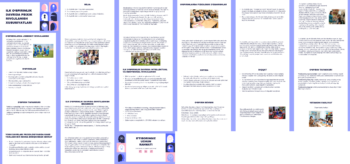
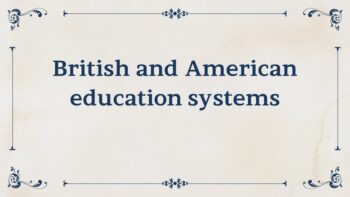

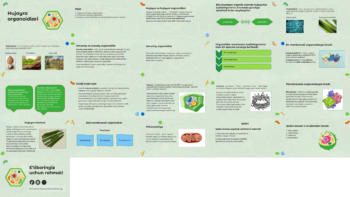
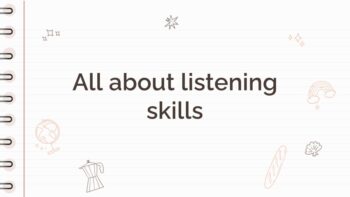
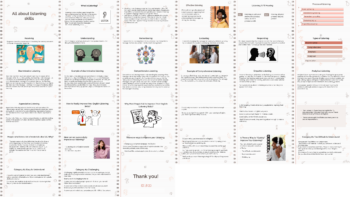

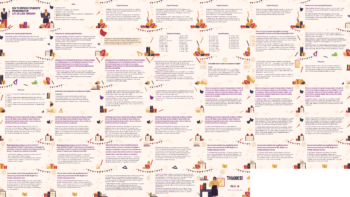

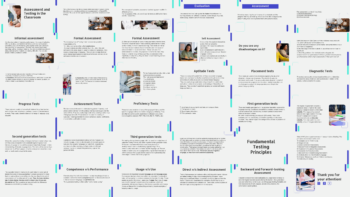
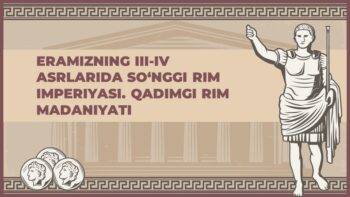


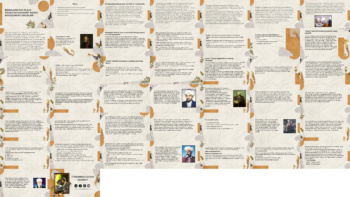
Sharhlar
Hali sharhlar mavjud emas.